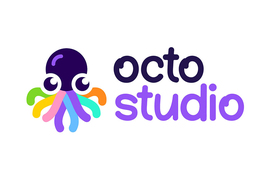A group of schoolchildren in Chile walk on a hillside, taking photos of plants and animals with mobile devices. They later integrate the photos into animated stories about the local environment.
Two friends in Uganda create an interactive game with an animated chicken that moves across the screen as you tilt the phone — and speaks aloud in Swahili when it finds water.
A girl collaborates with her mom to make an animated birthday card for her grandmother, including family photos and a personalized birthday greeting that she sings into the phone.
All of these young people created their projects with a free mobile coding app called OctoStudio, released publicly today by the Lifelong Kindergarten research group at the MIT Media Lab.
Around the world, more and more children and teens have access to mobile devices, but many spend hours passively watching videos and scrolling through social media. By contrast, OctoStudio invites young people to use phones and tablets to express themselves creatively — and, in the process, also learn computational and problem-solving skills.
“We designed OctoStudio to expand opportunities for young people to create projects anytime, anywhere," says Natalie Rusk, the Media Lab research scientist who leads the OctoStudio project in the Lifelong Kindergarten group. “We’ve seen how much children learn when they have opportunities to build on their interests, express their ideas, and share with others.”
OctoStudio builds on decades of research by the Lifelong Kindergarten group on the design of new technologies to engage young people from diverse backgrounds in creative learning experiences. The group previously invented Scratch, the world’s most popular coding language for kids, used by tens of millions of young people around the world.
OctoStudio is designed especially for children and families in communities where access to computers and internet is limited, but mobile phones are widespread. Throughout the design process, the Lifelong Kindergarten team has been collaborating with educators in Brazil, Chile, India, Korea, Mexico, South Africa, Uganda, and other countries around the world. To ensure widespread access, OctoStudio is completely free of charge and does not require any network connection or data charges.
“The majority of my youth don't have Wi-Fi at home. They don't have laptops or desktops. But most of them have access to a cellphone, and that means they also have access to OctoStudio. And what that is going to do is spread the love for creating,” says Dolores Hernandez, who introduced a prototype of OctoStudio to youth at the Clubhouse after-school learning center in San Antonio, Texas.
Linford Molaodi, lecturer and program manager of the creative coding project at University of Johannesburg in South Africa, appreciates how OctoStudio is designed with images, sounds, and examples that connect with the interests and experiences of young people from different cultures. “It’s important for children to be able to create projects that are meaningful and relatable to them, and that reflect their neighborhoods and surroundings,” he says.
As young people create with OctoStudio, the world is their palette, full of creative possibilities. They can take photos and record sounds, bring them to life with coding blocks, and send their projects to family and friends. Using the phone’s sensors, they can create projects such as musical instruments that play sounds when they jump, games that react to the tilt of the phone, or collaborative projects that use Bluetooth to beam signals between phones.
“When the students start to use OctoStudio in the classroom, they become engaged in playful exploration and creative learning,” says João Adriano Freitas, a creative coding specialist with the Brazilian Creative Learning Network. “Kids start creating, experimenting, collaborating, and sharing ideas with one another.”
At OctoStudio workshops in public libraries in Tacoma, Washington, MIT researcher Jaleesa Trapp saw a similar spirit among children and their parents: “The families were so enthusiastic. Some of the parents shared their children’s projects with family and friends. The parents were so excited to show what their children were able to create with code — and that’s huge, to get parents on board.”
OctoStudio is now available for free in app stores for both iOS and Android, and includes translations in more than 20 languages. OctoStudio does not collect any personal data, and does not track people who use it in any way.
More than a dozen people in the Lifelong Kindergarten group are now working on OctoStudio. The group continues to add new features, resources, and translations based on its ongoing collaboration with educators around the world. Key collaborators include Brazilian Creative Learning Network, the Tinkering Studio at the Exploratorium, Future Lab, Cruzando Foundation, Pratham Shah PraDigi Centre, and the Creative Communities group at University of Colorado Boulder. Financial support for OctoStudio comes from the LEGO Foundation, Smilegate Foundation, Little BlueBridge Foundation, National Science Foundation, and the MIT Media Lab.
















